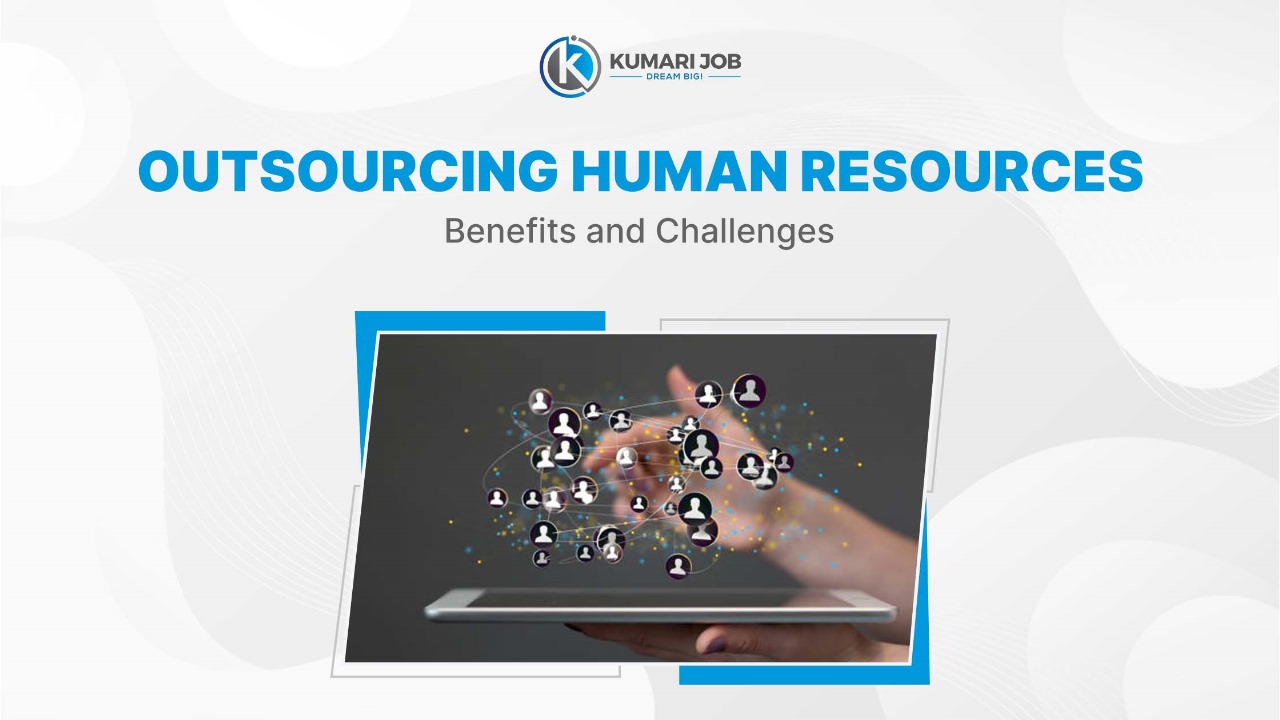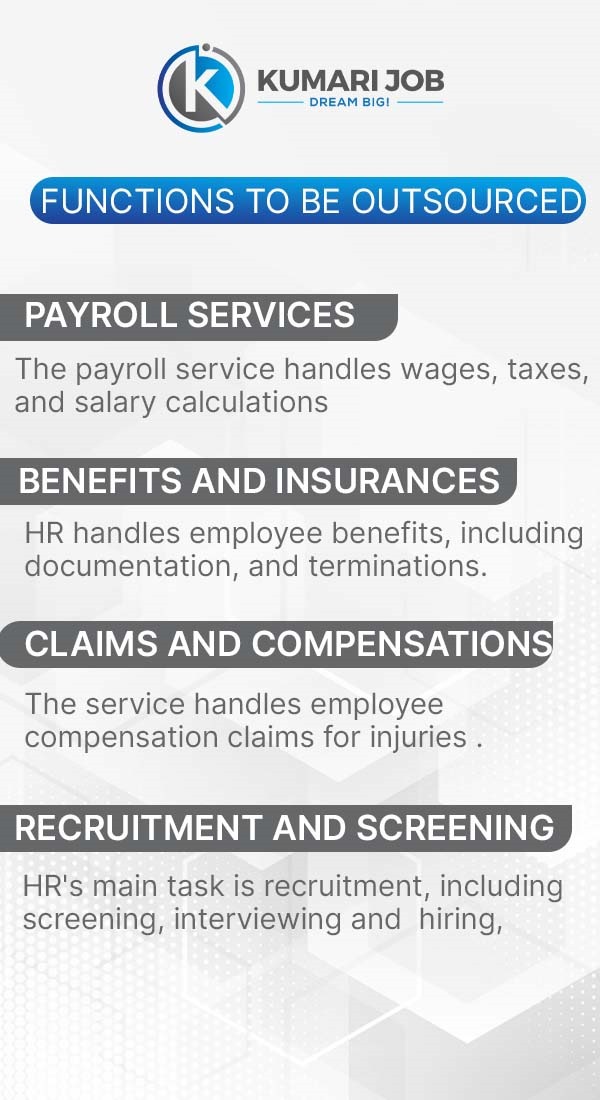
What is human resource outsourcing?
Human resource outsourcing is a practice in which an organization hires a third-party organization to handle its human resources activities and administrative tasks. In other words, HR outsourcing is the process of receiving work previously completed by corporate personnel from sources outside the company.
Human Resource Outsourcing (HRO) is the process of subcontracting human resources functions to an outside organization. Experts in the field of HRO point out that it is a flexible and cost-effective way to manage HR functions. It is suitable for organizations that want to improve accuracy, efficiency, and productivity, as well as those with variable workloads. The outsourced function could be as technical as health and safety and risk management or as simple as the administration of HR processes. When many organizations think of human resource outsourcing, the first element that comes to mind is payroll. However, there are many other facets to the outsourcing of HR, and in fact, payroll is only one of several services that are covered by human resource outsourcing. It provides
HR professionals have more time to focus on the business's strategic and core competencies. This can be extremely helpful to a company, as outsourcing HRO can provide benefits in terms of cost savings, improved efficiency, and allowing HR personnel to focus on more important things such as identifying and developing talent within the organization. Every company will have its reasons for using human resource outsourcing. However, the top reasons usually involve accessing special knowledge or expertise, reducing operating costs, and improving company focus.
In this blog
- What is human resource outsourcing?
- Types of HR outsourcing
- Why is HR outsourcing is important?
- What are the challenges of human resource outsourcing?
- What HR services are typically outsourced?
- Difference between a Professional Employer Organization (PEO) and HR outsourcing:
- Best Practices in Human Resource Outsourcing
- Conclusion
- Frequently Asked Questions
Types of HR outsourcing
- Application Service Provider
- Business Process Outsourcing
- Total HR Outsourcing
Application Service Provider: Many companies provide hardware and software applications, which are devised to support human resource activities in organizations and businesses. The software is installed and customized by the provider, who usually arranges further support.
Business Process Outsourcing (BPO): All important processes of the company may be outsourced and delivered by external service providers. Multinational corporations (MNCs) are particularly interested in outsourcing their operations, regardless if they are: front office (customer service), back office (generic business), or middle office (operational procedures) processes. BPO is particularly useful for companies, which operate in many countries and employ a great number of individuals. In BPO, the client has contact with HR services through support centers, which may be located anywhere in the world.
Total HR Outsourcing This type of outsourcing may be riskier than other types since all the HR functions are performed by the external service provider and there is no HR department in the company. It is possible, that the company employs some senior HR professionals, but it may not be necessary.
Know more: https://www.kumarijob.com/blog/career-tips/outsourcing-strategy
Why is HR outsourcing is important?
1. Cost-effective: When an organization outsources HR tasks, it eliminates the need to hire skilled workers. In addition, it rules out the need to organize training programs for new employees. This improves work efficiency and quality, along with cost savings.
2. Risk Minimization: Payroll processing, administration of incentives, and other arduous HR processes may be time-consuming. Due to a lack of experience, processing errors may occur in these areas of HR activities. Since HR outsourcing services generally entail the work being delegated to those who are already specialists in the field, you minimize the chances of risk and error.
3. Support & Compliance: The expansion of a business into a new market or region demands conformity to local tax and labor rules that differ from region to region. Hiring a competent outsourcing firm helps assure law and regulatory compliance in HR processes.
4. Security of Data: When working with sensitive information, data security is critical. To keep the data secure, respectable HR outsourcing companies use advanced security systems and software encryption.
What are the challenges of human resource outsourcing?
1. Threat to security and privacy
As human resources requires access to certain personal and sensitive details of the employee, such as bank details and medical details, a lot of care has to be taken to safeguard the privacy of the employee and the company. Outsourcing HR services may make employee data vulnerable if the outsourced company's software is not secure. In some cases, certain service providers utilize web-hosted software for HR functions, making employee information vulnerable to crashes and security threats. No employee would want to have personal banking or medical information leaked to the public.
2. Disconnected with staff
The main function of human resources as the word "human" indicates is to be the representatives of the critical issues of the employees and make employees feel that they are valuable to the company and their voice is heard and honored. When outsourcing HR duties to a third party or a computer software, this human touch of the human resource is lost. This can make the valuable staff feel a sense of disconnection with the company, and the company might not be able to comprehend the needs of the staff.
3. Lack of control
When HR is outsourced to a third party, the company may feel a loss of control over the workforce and remain uninformed. Even by working closely with the outsourced partner, it is not possible to be aware of all day-to-day processes. Giving an external party control over the company's internal processes is difficult and can make the company lose sight of the workplace dynamics, leading to insecure, unhappy employees who are less productive and less engaged.
4. Changes in Work Culture
An outsider or a third-party service provider would not be aware of the company's work culture and ethos as much as in-house staff or HR would be. It is undoubtedly difficult for a service provider to understand all this, and most importantly, it takes time to build a rapport. An in-house HR staff can be the key to keeping the company's work culture and ethos intact.
5. Less Flexible
Usually, in small firms, when in a personal emergency, the employee can sort it out better with an in-house HR in terms of urgent fund withdrawal or any other such requirement, but the same is not the case when the HR is either outsourced or automated. Though not impossible, it gets difficult to provide instant help to the employees.
6. No Instant Solutions
Though the chances of errors could be reduced by outsourcing it to a professional HR service provider or getting them automated, errors cannot be ruled out. In such situations, it takes longer to fix the issue. An in-house HR can attend to it immediately, but not so when it is outsourced to an external party.
Know more: https://www.kumarijob.com/blog/career-tips/outsourcing
What HR services are typically outsourced?
Several HR functions are commonly outsourced by businesses to third-party providers. These outsourced HR services include:
1. Payroll Processing: Outsourcing payroll processing involves handing over the responsibility of calculating employee wages, withholding taxes, issuing paychecks or direct deposits, and maintaining payroll records to a third-party provider.
2. Benefits Administration: This includes managing employee benefits such as health insurance, retirement plans, and other perks. Outsourced benefits administration can involve enrollment, eligibility verification, claim processing, and employee communication related to benefits.
3. Recruitment and Staffing: Businesses may outsource recruitment processes to external agencies or firms. This can include sourcing candidates, screening resumes, conducting interviews, and coordinating hiring activities.
4. Employee Training and Development: Outsourcing training and development programs can involve partnering with specialized training firms or e-learning platforms to provide employees with skills development, compliance training, leadership development, and other learning initiatives.
5. Compliance and Legal Support: Outsourcing compliance and legal support involves seeking assistance from legal firms or HR consulting companies to ensure that the organization adheres to employment laws and regulations. This may include drafting employment contracts, policy development, and handling legal issues related to HR.
6. HR Consulting and Strategic Planning: Businesses may engage HR consultants to provide strategic guidance on HR initiatives, organizational development, succession planning, and other long-term HR strategies.
7. Employee Assistance Programs (EAP): Outsourcing EAP services allows employees to access counseling, mental health support, and other assistance programs through external providers.
8. HR Technology Solutions: Outsourcing HR technology involves utilizing software-as-a-service (SaaS) platforms or IT consulting firms to implement and manage HRIS (Human Resources Information Systems), applicant tracking systems (ATS), performance management software, and other HR tech solutions.
9. Employee Relations and Conflict Resolution: Businesses may outsource employee relations functions such as managing grievances, resolving conflicts, and conducting workplace investigations to HR consultants or legal experts.
10. Exit Interviews and Offboarding: Outsourcing exit interviews and offboarding processes involves gathering feedback from departing employees, conducting exit interviews, and managing the offboarding process to ensure a smooth transition for both the employee and the organization.
Outsourcing these HR functions allows businesses to streamline operations, access specialized expertise, reduce costs, and focus on core business activities. However, the extent of outsourcing varies depending on the organization's needs, size, industry, and strategic priorities.
Difference between a Professional Employer Organization (PEO) and HR outsourcing:
Professional Employer Organization (PEO) and HR outsourcing are both strategies used by businesses to manage their human resources functions more effectively, but they differ in their scope and level of involvement. Here's a breakdown of the differences between the two:
1. Scope of Services:
PEO: A PEO offers a range of HR services, including payroll, benefits administration, compliance, risk management, and recruitment, becoming co-employers with clients.
HR Outsourcing: HR outsourcing offers flexibility and customization by outsourcing specific HR functions to a third-party provider, without the need to become a co-employer.
2. Employer Relationship:
PEO: A PEO arrangement involves the PEO becoming a co-employer of the client's employees, assuming responsibilities like payroll taxes, benefits administration, and workers' compensation.
HR Outsourcing: HR outsourcing involves a third-party provider managing HR functions without becoming a co-employer, allowing the client business to maintain full control over employment decisions and relationships.
3. Risk and Liability:
PEO: PEOs, as co-employers, bear some HR risk and liability, including legal compliance, payroll taxes, and workers' compensation, often offering insurance coverage and risk management services.
HR Outsourcing: HR outsourcing allows the client business to manage compliance and risk, with the provider providing guidance and support, but ultimately the client's ultimate liability.
4. Cost Structure:
PEO: PEOs typically charge a fee based on a percentage of the total payroll or a fixed fee per employee. This fee structure may cover a bundle of HR services.
HR Outsourcing: HR outsourcing services can be priced on a project, hourly, or subscription basis, offering clients flexibility and potentially lower costs compared to a comprehensive PEO arrangement.
In summary, PEOs and HR outsourcing involve delegating HR functions to third-party providers, with PEOs involving deeper integration and HR outsourcing offering flexibility in service selection and control over employer-employee relationships.
Best Practices in Human Resource Outsourcing
1. Clearly Defined Service Level Agreements (SLAs):
Outsourced HR services should be defined with specific metrics like response time and payroll accuracy. The roles and responsibilities of both providers and clients should be clearly defined, and provisions should be made for addressing deviations from agreed-upon SLAs.
2. Regular Performance Monitoring and Reporting:
The outsourcing provider should be regularly monitored against SLAs using key performance indicators (KPIs) to track HR services like employee satisfaction and turnover rates. Regular reporting mechanisms should be implemented to provide visibility into outsourced HR operations, including both quantitative and qualitative metrics.
3. Effective Change Management Strategies:
The plan involves creating a change management strategy to ensure smooth transitions during the outsourcing process, clearly communicating the reasons and impact to internal stakeholders, providing adequate training and support to affected employees, establishing feedback mechanisms, and continuously evaluating and adjusting strategies to ensure successful implementation of the outsourcing initiative.
These practices can help organizations effectively manage their outsourced HR functions while maintaining high standards of service delivery and employee satisfaction.
Conclusion
Human Resource Outsourcing (HRO) streamlines HR functions, reduces costs, and enhances efficiency, but it requires careful planning, clear communication, and effective management. While it offers benefits like flexibility and cost-effectiveness, addressing challenges such as data security and employee engagement is crucial for success.
For those interested in HR careers, Kumari Job provides job opportunities in HR outsourcing and other fields across Nepal. Additionally, if you're looking to enhance your HR skills, HR training in Nepal can help you gain the expertise needed to excel in this growing sector. Start your career with Kumari Job or improve your skills through HR training to drive organizational success.
Frequently Asked Questions
As AI, machine learning, and data analytics mature, it will become increasingly data-centric. In the future, HR outsourcing will empower organizations with better talent acquisition strategies, more precise employee engagement initiatives, and enhanced workforce productivity.
- Recruitment and selection.
- Performance management.
- Learning and development.
- Succession planning.
- Compensation and benefits.
- Human Resource Information System.
- HR data and analytics.
Outsourcing HR services can be a strategic approach to managing human capital for organizations. It allows organizations to focus on their core business operations while entrusting HR functions to external outsourcing companies.
The finance, healthcare, and insurance sectors are three common industries that benefit from outsourcing. Outsourcing saves labor costs, time, and energ









Loading Comments...